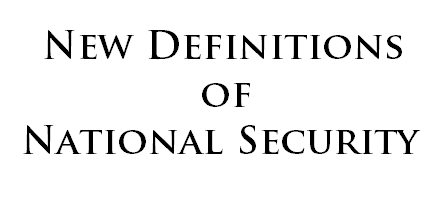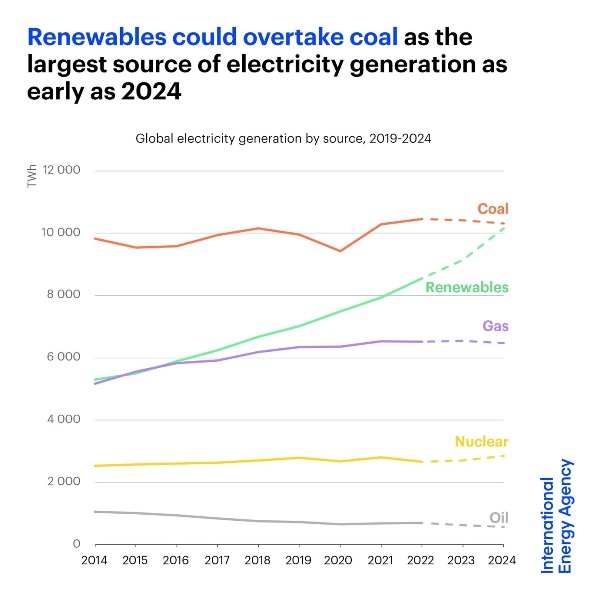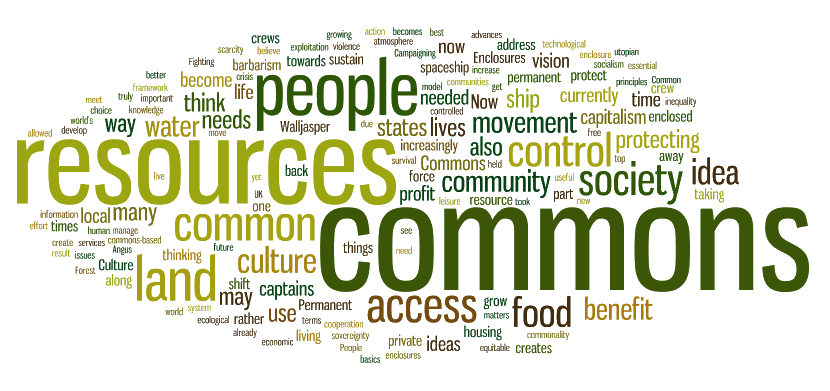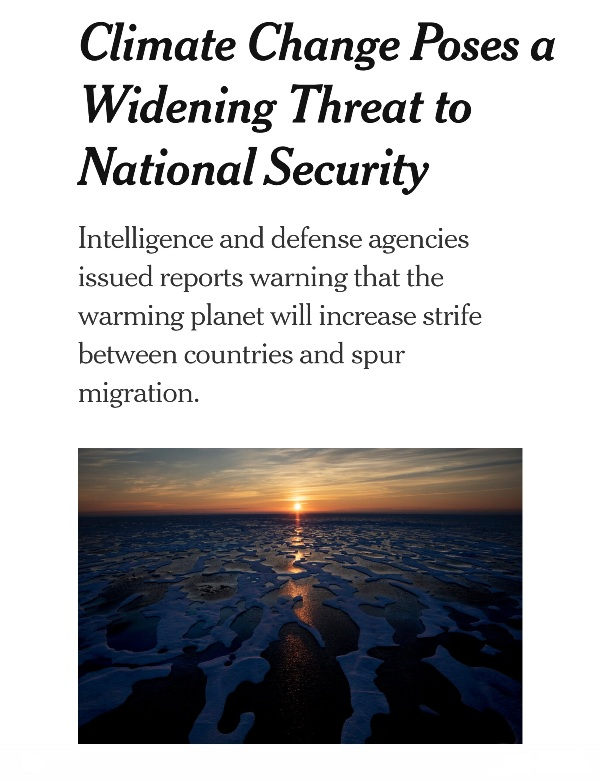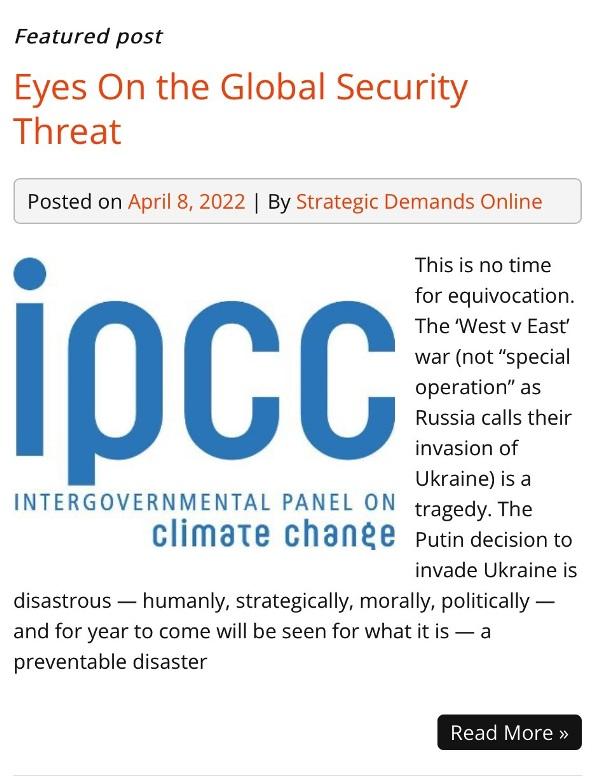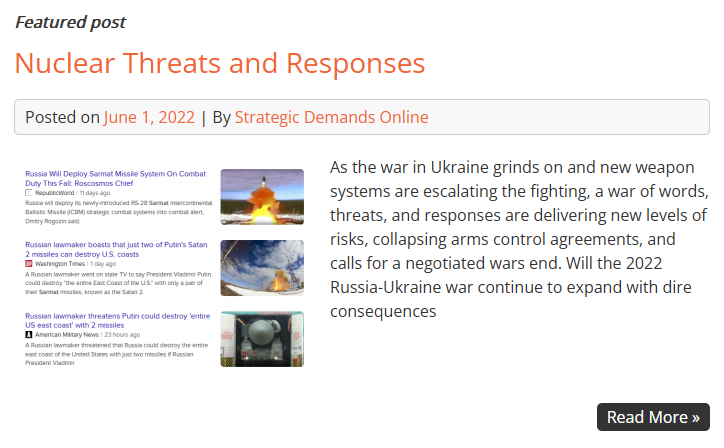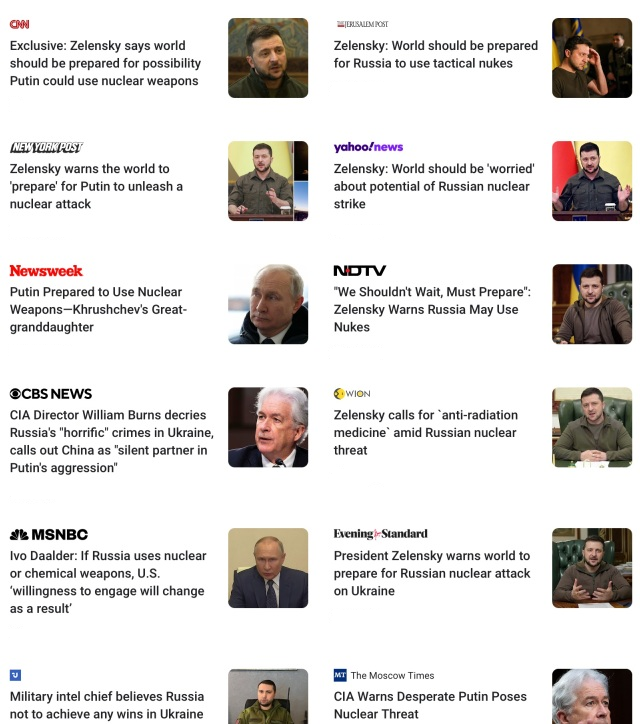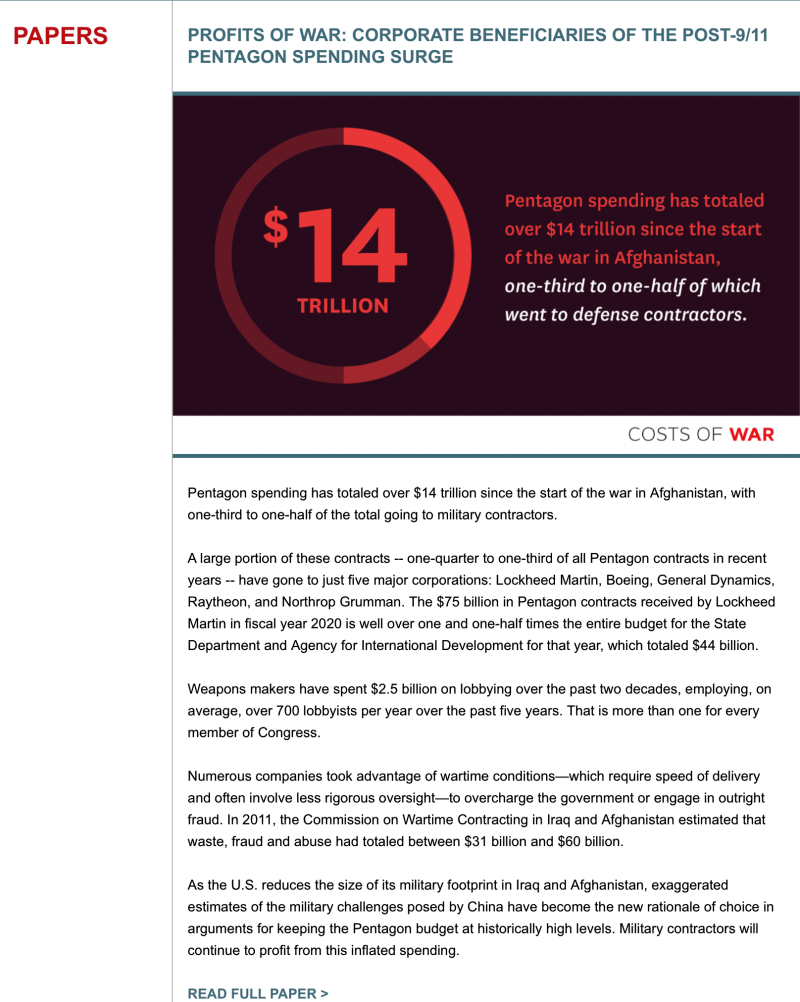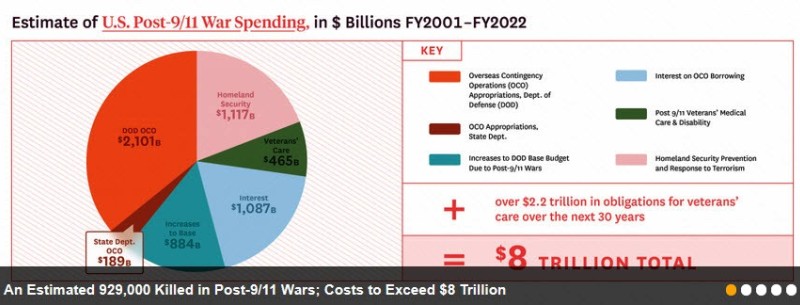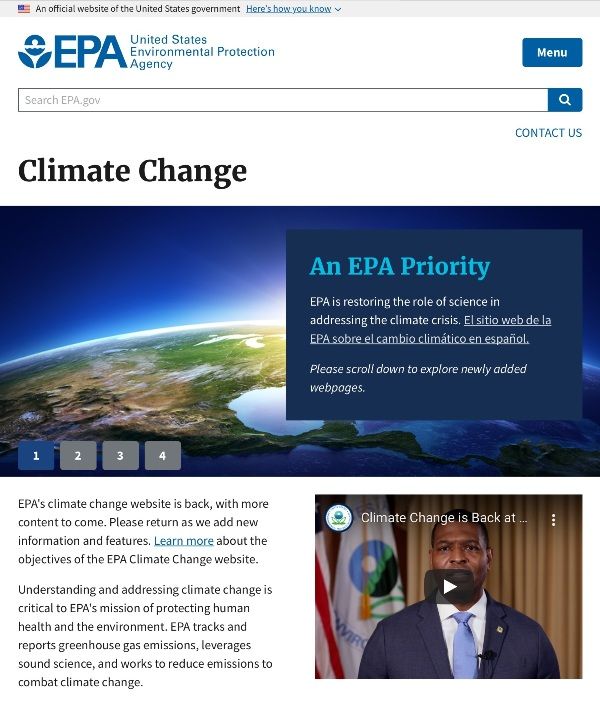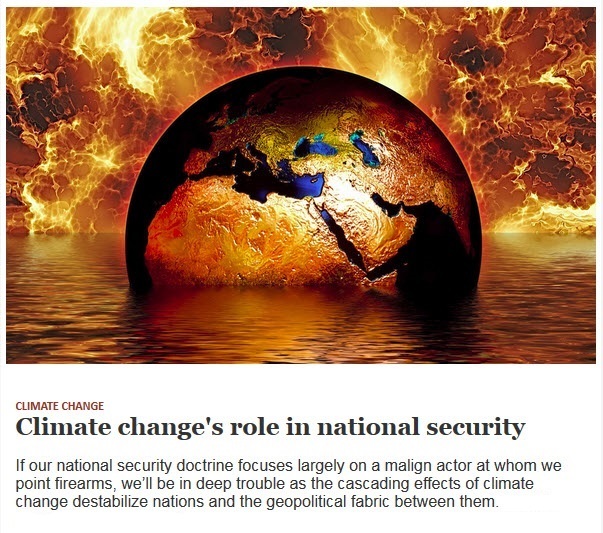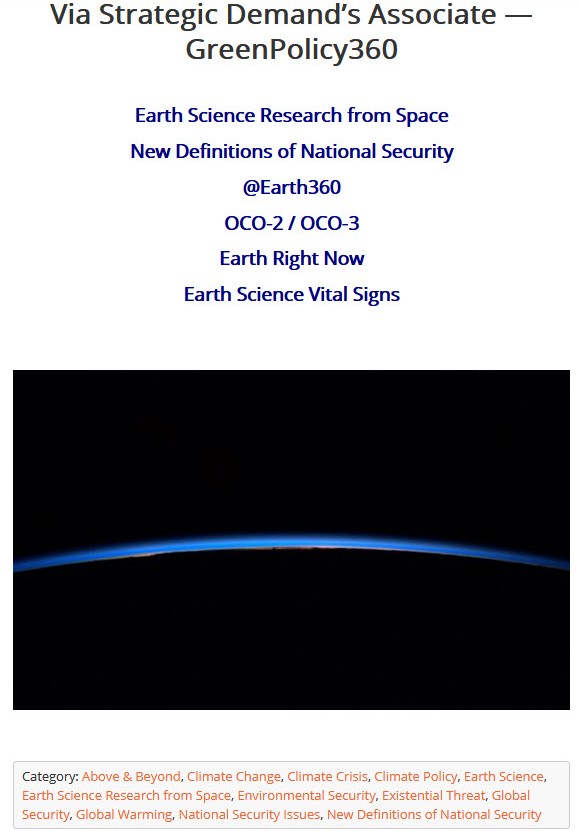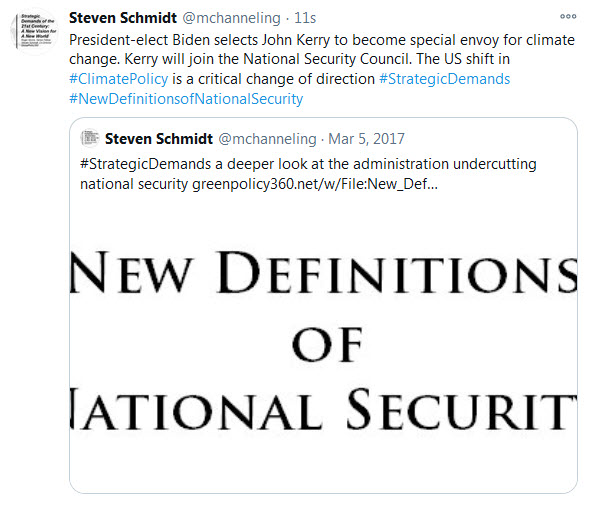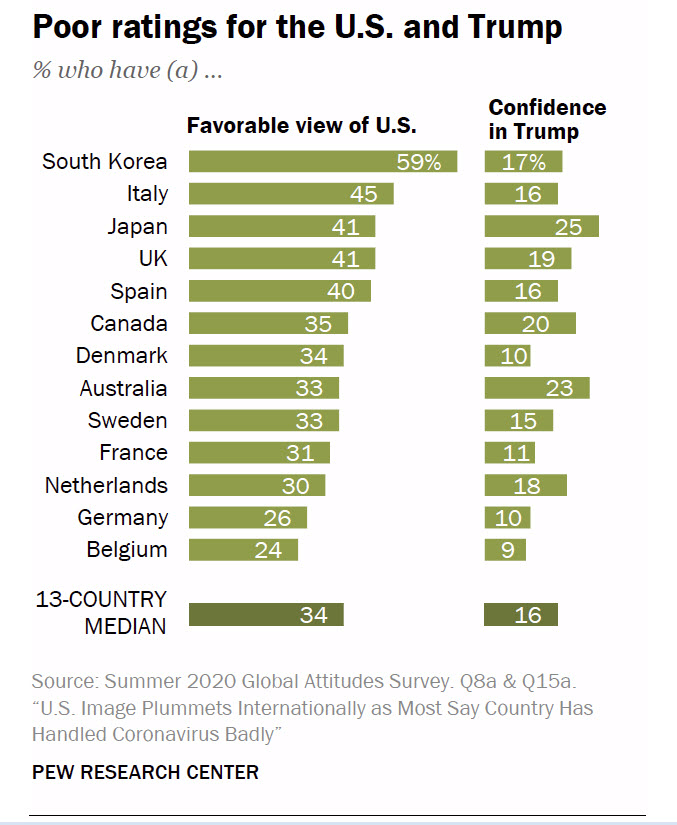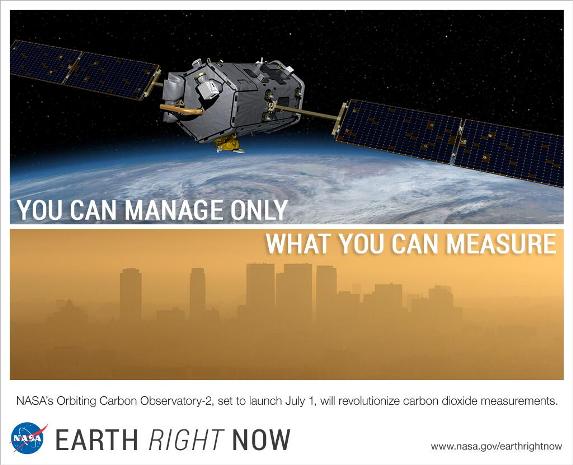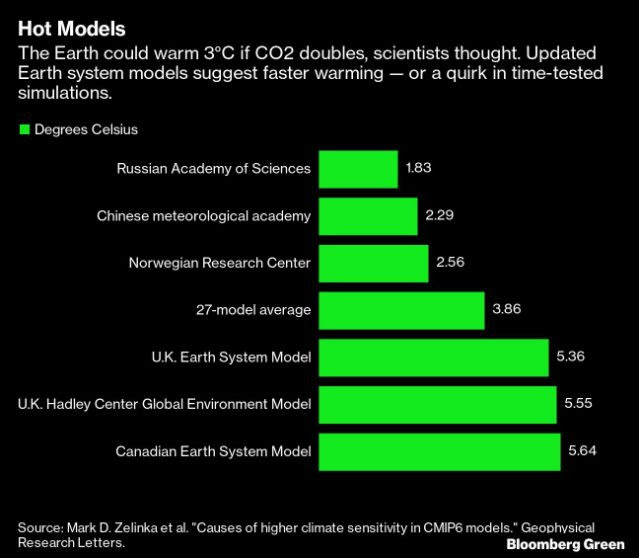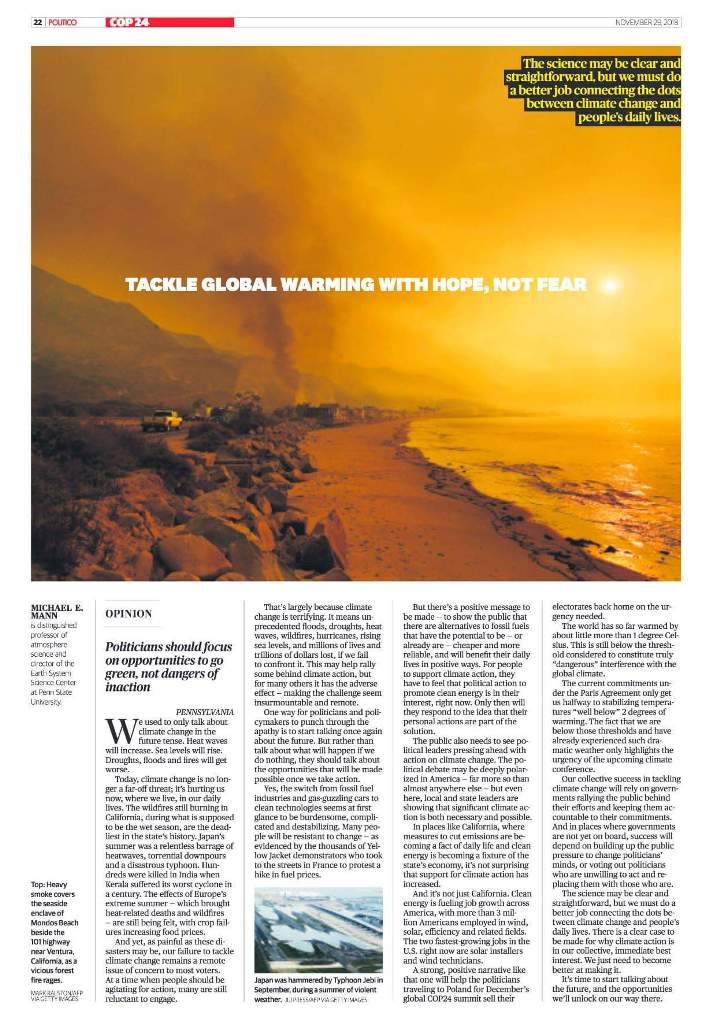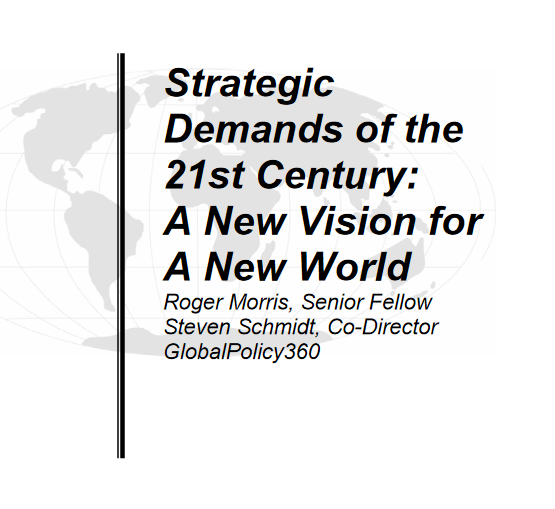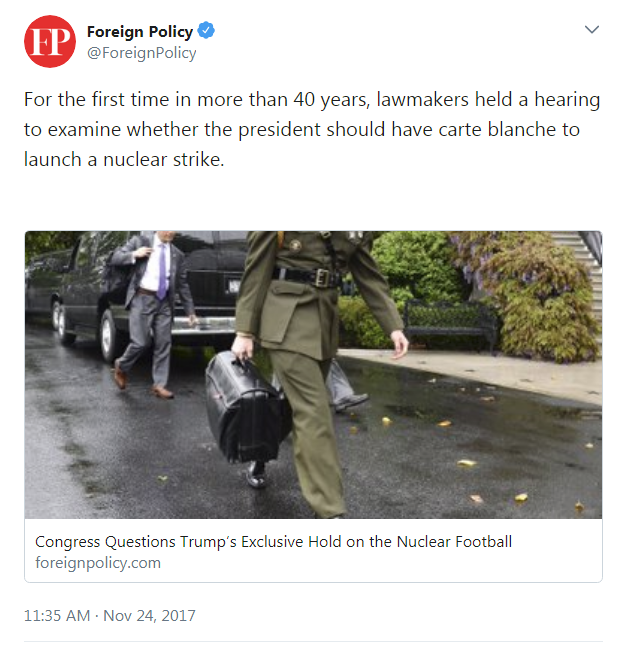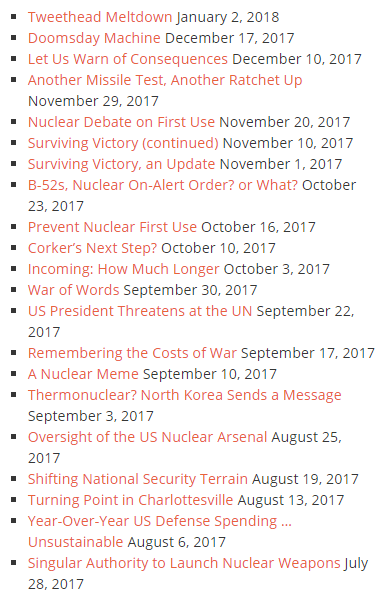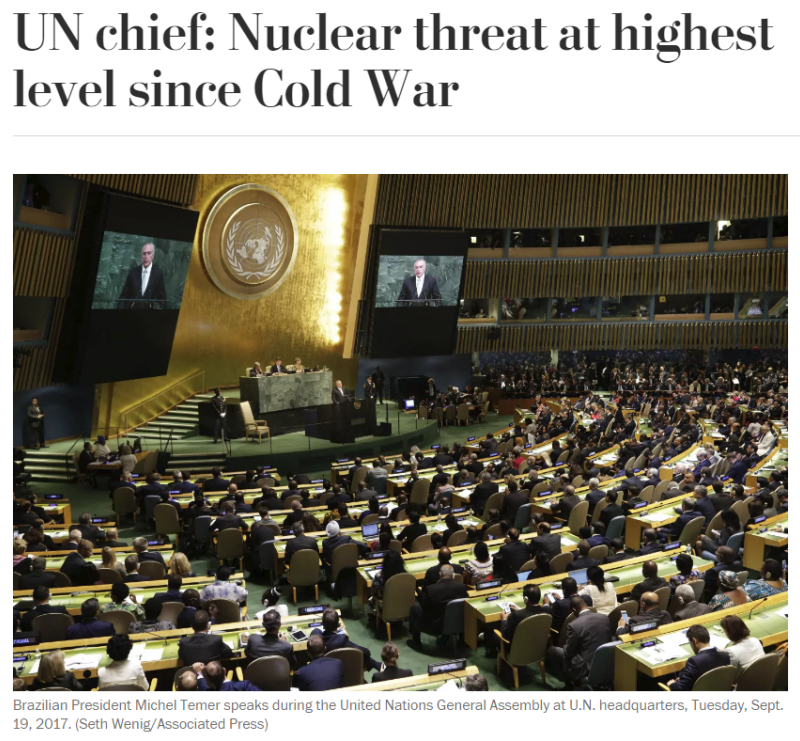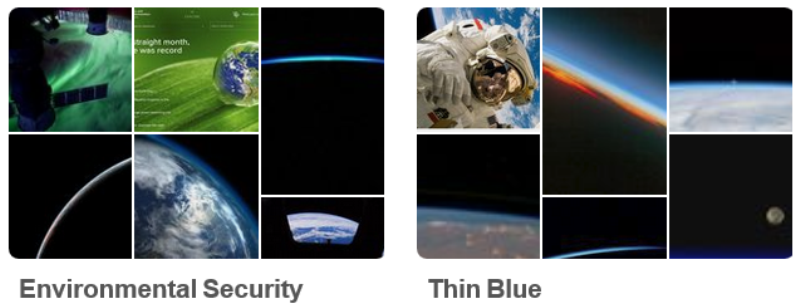New Definitions of National Security
GreenPolicy360 / New Horizons of Security
New Definitions of National... and Global Security
🌎
GreenPolicy360 & Strategic Demands / #StratDem
GreenPolicy360/StrategicDemands: The key to 21st century security is "strategic realism". Any full scientific assessment of security threats on the horizon is replete with environmental/global risks that are drawing daily into view. These risks are presenting a clear and present danger, in U.S. Department of Defense terms. A 'clear and present danger' has yet to be acknowledged by the US Department of Defense, or in the US military budget that approaches $1 trillion in annual spending. Other nations continue a race seeing security in terms of defense/military spending. This cannot be sustained. Forward planning with a new and more acutely aware vision of security is demanded now.
GreenPolicy360 and its associate Strategic Demands challenge prevailing views that are not focused as they must be on existential threats of our era. A new vision of security must drive the politics of our times. New definitions of national and global security must become highest priorities.
We specifically point at the US 'National Intelligence Program' and its annual threat assessment reports. We see a shift taking place in the intelligence community (IC) as it is now beginning to recognize and acknowledge environmental security as a crisis that is no longer distant. The climate crisis is real. Severe eco-impacts are being experienced by communities, national to local, as science is reporting with voluminous data and attendant warnings.
Action is demanded. We must move climate and environmental impacts from 'irritants' to a central role as we rethink security risks. GreenPolicy360 and Strategic Demands point the way toward the new definitions, responses and solutions necessary for comprehensive, and sustainable security.
NASA
GreenPolicy360 Founder / Siterunner
New definitions of national and global security, new strategic priorities are necessary for a more rational defense of our larger security interests... It is critical to move beyond the failed national security policies of the past.
🌎
2023
A geopolitical shift in the Mideast is increasingly within strategic demands vision, as the world transitions to renewable energy and wrests itself off decades of wars to control and secure fossil fuel sources. GreenPolicy360 climate-related energy conversion plans are increasingly in action.
War and oil have been inextricably linked since the early 1900s and European militaries transitioned from coal to oil. The newly discovered great oil fields in the Mideast led to a rush to control these essential strategic assets. The demand for oil to power industrialization is a story of the 20th century and for decades wars raged to own and control energy supplies emanating from this resource rich region.
Yet few realize the arc of these struggles and their costs passed forward. Now as another war is declared, one must acknowledge the costs and dangers of what is called "blowback", most notably by Chalmers Johnson in his books that have turned focus to the causes, costs and consequences of 100+ years of geopolitics, religion and revenge. Memories go back centuries and in modern times one can point to the British navy's transition of its warship fleet from coal to diesel oil, originating circa 1910 with Winston Churchill's decisions and Britain's military actions to control Iranian oil fields. This can be seen, generationally, as one in a generational nexus that have led to current Mideast conflicts. Iranian (Persian) oil powering the global British colonial power, a chessboard of Western nation moves to control oil/gas/fossil fuel-carbon resources in the region... and wars-begetting-wars, with an eye-for-an-eye biblical background and blowback operating and consequential dynamics.
The consequences of war are lasting and blowback should be taught in 'war colleges'.
- https://www.amazon.com/Blowback-Consequences-American-Empire-Project/dp/0805075593
- https://www.goodreads.com/book/show/40718.The_Sorrows_of_Empire
- https://www.goodreads.com/book/show/64711.Nemesis
The overarching concept of "New Definitions of National Security" proposed by GreenPolicy360 and its associate, Strategic Demands, looks away from strategic power orthodoxies, 'war works', 'constant war works', 'might makes right'.... These beliefs have become axiomatic, conventional, orthodoxies that are now often referred to as 'Orwellian'. Yet, of course, war is (not) peace, and constant war (does not) bring constant peace.
The litany of failed orthodox beliefs are more visibly producing generational conflict and arms races. With nuclear weapons added now to the mix the threat is extending to all life on Earth and to all nations. It's dawning that a new vision of security is needed, one that new clean, renewable energy sources can assist in making changes in everyday life possible.
Environmental security and quality of life are essential to peace and well-being. Time to listen and shift how we define security threats is at the center of GreenPolicy360 & Strategic Demands work.
- https://strategicdemands.com/new-definitions-of-security/
- https://strategicdemands.com/environmental-security/
- https://strategicdemands.com/costsofwar/
Climate Action Plans 360
- https://www.greenpolicy360.net/w/Climate_Plans_Enforcement_-_Resources | GrnPolicy360: Climate Plans Enforcement Initiative
- https://www.greenpolicy360.net/w/File:Methods_to_enforce_climate_pledges-NDCs_-_Dec_2021.png | Methods to Enforce Climate Plan Pledges
- https://www.greenpolicy360.net/w/Category:INDC | Pressuring Nations to Step Up, Cooperate, and Act Now
- https://www.greenpolicy360.net/w/File:Global_Stocktake,_the_first_GST.jpg | Com't on Earth Observation Satellites
- https://www.greenpolicy360.net/w/Category:Environmental_Laws | Environmental Laws, Regs, Rules... Lawsuits & Legal Actions
- https://www.greenpolicy360.net/w/Glasgow_Climate_Summit_-_Pledges,_Promises,_Declarations_-_What%27s_Next_Up | Glasgow (2021) & Paris (2015) Summits: Int'l Climate Plan Pledges & Promises (INDCs-NDCs)
············
2022
June 2022
GreenPolicy360: A tip of our hat to Bill McKibben, our former adviser and long-time friend, who points to a decision by the U.S. president to invoke the Defense Production Act as a signal that new definitions of national security are demanded as the nation attempts to move with speed and scale to renewable energy.
Let's look at the decision via two articles -- one, news and two, opinion.
Activists hail Biden’s use of security powers to boost clean energy
President invokes Defense Production Act to increase production of solar panels, building insulation and other equipment
Environmental groups have welcomed Joe Biden’s invoking of national security powers to rapidly expand the production of clean energy technology as a significant advance in the effort to curb dangerous climate breakdown.
Biden has triggered the Defense Production Act, a cold war-era law used to compel businesses to ramp up production of certain materials to aid national security, to boost the output of solar panels, building insulation, transformers for power grids and heat pumps, which are used to efficiently heat and cool homes.
The US president has also provided a two-year exemption to solar panel companies from tariffs on imported parts, easing the flow of technology from China and other countries for use in the US, a country where only 2.8% of electricity comes from solar power.
The moves have been applauded by climate activists who have pressed for Biden to use the breadth of his presidential powers to act on the climate crisis. Activists have sharply criticized the president in recent months over the continuing failure to pass major climate legislation through an evenly divided Senate...
The use of the Defense Production Act will allow the US Department of Energy to invest in companies that can build renewable energy facilities and manufacture parts for technology such as solar panels. The administration expects domestic solar manufacturing will now triple by 2024, allowing more than 3.3m homes each year to switch to solar energy.
A shift to cleaner sources of electricity would also help protect against energy bill volatility and provide efficiency to households, say proponents – heat pumps, for example, can save homes $1,000 each year from space heating alone. The administration has also sought to stress the benefits of weaning the US off the supply of fossil fuels from countries such as Russia. “Reducing America’s dependence on gas and oil is critical to US national security,” said Kathleen Hicks, deputy secretary of defense.
Enormous Thanks to All Who Helped Win a Big Heat Pump Victory Today
By Bill McKibben
June 6, 2022
Earlier today, President Biden signed the above order, which mandates the use of the 1950 Defense Production Act to sput the production of heat pumps, because, as he puts it in the text, “ensuring a robust, resilient, and sustainable domestic industrial base to meet the requirements of the clean energy economy is essential to our national security, a resilient energy sector, and the preservation of domestic critical infrastructure.”
Readers of this newsletter played a big role in making this happen. I broached the idea here on February 27, 3 days after the Ukraine invasion, in an article called Heat Pumps for Peace and Freedom. Within a couple of days, a group called Rewiring America had fleshed out the plan, and Third Act had begun to push it out across the country, getting older Americans to write letters by the score. Between you all, the effort paid off. Biden’s order isn’t precisely what we’d called for, since the heat pumps are destined for U.S. homes instead of European ones—but that may well be more politically palatable, and in any event, as we’ve pointed out over and over, oil is a global market. If we can suppress demand here by giving people efficient technology, it will help drive down the windfall that rising oil prices have provided Putin.
In any event, three cheers
One is for the Biden administration, which has done something admirable. I was talking to a Wall Street Journal reporter over the weekend, lamenting that Manchin had managed to bottle up the Biden climate program—this is a sign that the president’s team is finally uncorking that bottle. And they did it quickly—late February to early June is unprecedented speed in DC time.
A second is for Substack. As with most platforms, this one can be used for unpleasant infighting. But it also allows people to surface plans and ideas before they’re fully formed and vetted. If I had proposed that piece to some editor, they might well have said: ‘does anyone else care about this?” Which is the kind of smart and useful question that makes one happy to have editors. But sometimes it’s useful to be able to just get something out fast so that others can begin to react: if traditional journalism is the first draft of history, Substack in this fashion serves as the sketchbook for that first draft.
And the third cheer is for all of you. Ideas do absolutely no good unless lots of people get behind them and make noise. That’s what movements are—people making impossible things possible. I’m immensely grateful to everyone who wrote and pestered their politicians about this; it worked.
This single measure obviously doesn’t solve our problems, in Russia or in the atmosphere. But it’s a hopeful sign that we can still get something done. Stay tuned.
Subscribe to Bill McKibben on Substack
🌎
······································································································································
- From GreenPolicy360's associate, Strategic Demands
Ⅰ Ⅱ Ⅲ Ⅳ Ⅴ Ⅵ Ⅶ Ⅷ Ⅸ Ⅹ Ⅺ Ⅻ — Ⅻ Ⅺ Ⅹ Ⅸ Ⅷ Ⅶ Ⅵ Ⅴ Ⅳ Ⅲ Ⅱ Ⅰ
Biden's (and the World's) Imperiled Climate Agenda
Ⅰ Ⅱ Ⅲ Ⅳ Ⅴ Ⅵ Ⅶ Ⅷ Ⅸ Ⅹ Ⅺ Ⅻ — Ⅻ Ⅺ Ⅹ Ⅸ Ⅷ Ⅶ Ⅵ Ⅴ Ⅳ Ⅲ Ⅱ Ⅰ
May 2022
- The Russia - Ukraine War Continues Raising New Nuclear Risks
- Visit GreenPolicy360's Associate 'Strategic Demands' for More...
April 2022
War in Ukraine Multiplies International Threats
Threatened Use of Nuclear Weapons in the News
Ratcheting Up, New Nuclear Arms Race, Rapid Increasing in Weapons Budgets
U.S. Military Budget Analysts William Hartung and Julia Gledhill Examine the Numbers
April 17, 2022
Back in September 2008, Senator Joe Biden offered a bit of wisdom while running for vice president on Barack Obama's ticket. In a speech criticizing the Republican presidential campaign of senatorial colleague John McCain, he claimed to be quoting his own father when he said: "Show me your budget and I’ll tell you what you value."
... the next Pentagon budget, at an astronomical $813 billion dollars, is heading for passage by a humongous congressional majority. (To put that figure in perspective, it's $75 billion more than Donald Trump's last "defense" budget.) Worse yet, numerous representatives, particularly on the Republican side of the aisle, are already demanding yet more of the same. In fact, in think-tank Washington and beyond, there are now even calls for a future Pentagon budget that would top one trillion dollars annually. Imagine that, in a country already spending more on what's still called "national security" than the next 11 countries combined...
○
Ⅰ Ⅱ Ⅲ Ⅳ Ⅴ Ⅵ Ⅶ Ⅷ Ⅸ Ⅹ Ⅺ Ⅻ — Ⅻ Ⅺ Ⅹ Ⅸ Ⅷ Ⅶ Ⅵ Ⅴ Ⅳ Ⅲ Ⅱ Ⅰ
Moving from the Quotidian to the Big Picture...
Environmental Security ↔ National Security
National Security: Enhanced via Environmental Security
@ Strategic Demands: "New Definitions of National Security"
@ GreenPolicy360: "New Definitions of National Security"
2021
Upheaval in Central Asia Impacts the Future of Clean Energy Production?
'Rare Earth' Minerals & Mining Are Strategically Vital in EV Manufacturing
·································································
- GreenPolicy360/Strategic Demands:
Earth System Observatory @StrategicDemands
More on Earth Science Missions
·············································
NASA - Global Climate Change
Images of Change
31 Vital Earth Signs
'Virtual signs' worsening
Tipping points, deepening disaster
Researchers, part of a group of more than 14,000 scientists who have signed on to an initiative declaring a worldwide climate emergency, said that governments had consistently failed to address the root cause of climate change: "the overexploitation of the Earth".
Of 31 "vital signs"—key metrics of planetary health that include greenhouse gas emissions, glacier thickness, sea-ice extent and deforestation—they found that 18 hit record highs or lows.
·····················································································
"Cascading Challenges": Rumblings of a Shift in How the U.S. Assesses Security Threats
Senate Intelligence Committee’s Worldwide Threats Hearing
Via the Center for Strategic & International Studies (CSIS)
April 2021
This annual report of worldwide threats to the national security of the United States responds to Section 617 of the FY21 Intelligence Authorization Act (P.L. 116-260). This report reflects the collective insights of the Intelligence Community(IC), which is committed every day to providing the nuanced, independent, and unvarnished intelligence that policymakers, war fighters, and domestic law enforcement personnel need to protect American lives and America’s interests anywhere in the world.This assessment focuses on the most direct, serious threats to the United States during the next year. The order of the topics presented in this assessment does not necessarily indicate their relative importance or the magnitude of the threats in the view of the IC. All require a robust intelligence response, including those where a near-term focus may help head off greater threats in the future, such as climate change and environmental degradation.
What did Director of National Intelligence Avril Haines mean when she said the United States should “broaden our definition of national security?”
The Annual Threat Assessment (ATA) and following hearings devoted time to discuss the Covid-19 pandemic and climate change. While the IC has long had in-house experts exploring the national security implications of health issues and environmental pressures, both are generally considered as irritants giving rise to core national security considerations like political instability or resource-based conflict rather than national security issues in and of themselves. (boldface added) Director Haines seems to be advocating for a more central role for issues like these in the IC’s work.
And this is the rub: the world is big and complex, there is more data to read than any human can read, and many of the issues are intertwined. This is what the IC means by “cascading” challenges — a global pandemic is not merely a public health issue—it also causes economic disruption that can lead to migration and political destabilization, and the indicators providing warning of these threats are not stealable secrets. Sorting the signal from the noise in a world with a lot of noise is the central challenge for the IC, and it will need transformative reform, including massive computing resources and artificial intelligence and machine learning assistance, to make sense of it.
··························
Avril Haines was sworn in as the Director of National Intelligence on January 21, 2021. She is the seventh Senate-confirmed DNI in our nation’s history and the first woman to lead the U.S. Intelligence Community.
Office of the Director of National Intelligence
By statute, the DNI is the principal intelligence adviser to the President, and determines and manages the National Intelligence Program (NIP) budget of more than $50 billion, the U.S. government’s total intelligence spending aside from military intelligence. The DNI is also tasked with integrating the efforts of the 17 elements of the Intelligence Community (IC).
○
April 19, 2021
International Climate Meeting Online
At the invitation of the new US president, nations gathered this week in a virtual climate summit to share their Nationally Determined Contributions (NDCs) toward solving the climate change crisis.
We, GreenPolicy360 with our associate Strategic Demands, will cover news of the climate conference, both good and bad. Our several decades of pushing for immediate, concerted action and 'New Definitions of National Security' by all nations is front of stage, and confronted by old definitions of security, conflicts and wars, that take our eyes off of the existential challenges of climate -- and a resurgent, escalating nuclear weapons threat.
Here, in the Bulletin of Atomic Scientists, we look at a key group of experts sounding the alarm about both climate disaster and nuclear war.
They are the great challenges of our time and must given a spotlight and focus of our citizen action.
By most accounts, President-Elect Biden looks to position climate change as a central organizing principle in his Executive Branch. Through cabinet appointments of sympathetic experts at agencies not normally at the fore of environmental policy—such as Treasury, Justice, and Transportation—Biden hopes to deliver wide-ranging wins on climate policy. The EPA, the Energy Department, and the Interior Department will be redeployed in Obama-era roles as key instruments for aggressive climate action. These would all be positive steps forward.
····················································································································································································
Survey Finds Overwhelming International Support for Greater Environmental Protection
“We live in a time of polarisation, and environmental issues have long embodied the political divisions in society. However, this may be changing. We can see an overwhelming consensus emerging for greater government-led action to protect the environment in major nations.”
·······················································································································
Acknowledging a Profound Shift in U.S. Security Policy
Biden administration accelerates out of the starting gate
GreenPolicy360:
Yes, a redefinition of U.S. national (and global) security is now being envisioned. GreenPolicy360's point of view on the strategic demand for a new 21st century vision is taking place. The new U.S. Biden administration with governing leadership, executive orders, and promised follow-on legislative actions, is making a strong push to redefine real security. New definitions, new vision, operational multi-front action is 'in the works'...
Here, Michael E. Mann begins to capture the moment in a USA Today opinion:
Now, Biden is gathering his council to assess the current and future dangers in this fight, including all 17 intelligence agencies; a general on the international front, John Kerry, who will also have a seat on the National Security Council and will direct our diplomatic efforts abroad; and another general on the domestic front, former Environmental Protection Agency administrator Gina McCarthy, who will coordinate climate action in the homeland.
PART I — PUTTING THE CLIMATE CRISIS AT THE CENTER OF UNITED STATES FOREIGN POLICY AND NATIONAL SECURITY
Section 101. Policy. United States international engagement to address climate change — which has become a climate crisis — is more necessary and urgent than ever. The scientific community has made clear that the scale and speed of necessary action is greater than previously believed. There is little time left to avoid setting the world on a dangerous, potentially catastrophic, climate trajectory. Responding to the climate crisis will require both significant short-term global reductions in greenhouse gas emissions and net-zero global emissions by mid-century or before.
It is the policy of my Administration that climate considerations shall be an essential element of United States foreign policy and national security. The United States will work with other countries and partners, both bilaterally and multilaterally, to put the world on a sustainable climate pathway. The United States will also move quickly to build resilience, both at home and abroad, against the impacts of climate change that are already manifest and will continue to intensify according to current trajectories.
Sec. 102. Purpose. This order builds on and reaffirms actions my Administration has already taken to place the climate crisis at the forefront of this Nation’s foreign policy and national security planning...
○
Biden Team 'Hits the Ground Running'
Climate change ..... "an existential threat"...
President Biden steps up:
The executive order I’ll be signing establishes a White House Office of Domestic Climate Policy. And it’ll be led by one of America’s most distinguished climate leaders, former EPA Director Gina McCarthy. As the head of the new office and my National Climate Advisor, Gina will chair a National Climate Task Force, made up of many members of our Cabinet, to deliver a whole-of-government approach to the climate crisis.
(T)he whole-of-government approach is necessary... We’re going to work with mayors and governors and tribal leaders and business leaders who are stepping up, and the young people organizing and leading the way. My message to those young people is: You have the full capacity and power of the federal government. Your government is going to work with you.
... a new, modern-day Civilian Climate Corps ...
Look, this executive order I’m signing today also makes it official that climate change will be at the center of our national security and foreign policy...
Actionable solutions, not pie-in-the-sky dreams... it is not time for small measures; we need to be bold...
(T)oday’s executive order will help strengthen that commitment by working with other nations to support the most vulnerable to the impact of climate change and to increase our collective resilience. That includes a summit of world leaders that I’ll convene to address this climate crisis on Earth Day, this year.
In order to establish a new effort to integrate the security implications of climate change as part of our national security and risk assessment and analysis will also be included.
Earlier this month, I nominated Dr. Eric Lander, a brilliant scientist who is here today, to be the Director of the Office of Science and Technology. I also nominated another brilliant scientist, Dr. Frances Arnold and Dr. Maria Zuber, to co-chair the President’s Council of Advisors on Science and Technology...
············
2020
November 23, 2020
U.S. President Elect Selects John Kerry as International Climate 'Envoy'
- First-ever Climate Security Position Created by Biden
- Kerry to Join National Security Council with Presidential Cabinet-level Status
GreenPolicy360 & Strategic Demands applaud this historic, critically important shift in the U.S. policy and vision
For years GreenPolicy360 and StratDem have advocated Climate Policy become a U.S. National/Global Security priority
New Definitions of National & Global Security
·················································································
President-elect Biden planning to leave the Trump years of climate change denial behind
The incoming U.S. president pledges to act fast, to rejoin the international Paris climate agreement on his first day in office and immediately flex a muscular, aggressive program of climate actions
- ··············································································
Nationalism and Division: U.S. Reputation and Status Continues to Decline in the Eyes of the World
····························································································
This App Could Be a Game Changer
This could be a very big deal
There’s an old truism in the business world: what gets measured gets managed. One of the challenges in managing the greenhouse gas emissions warming the atmosphere is that they aren’t measured very well.
“Currently, most countries do not know where most of their emissions come from,” says Kelly Sims Gallagher, a professor of energy and environmental policy at Tufts University’s Fletcher School. “Even in advanced economies like the United States, emissions are estimated for many sectors.” Without this information “you cannot devise smart and effective policies to mitigate emissions,” she says, and “you cannot track them to see if you are making progress against your goals.”
The ultimate solution to this problem — the killer app, as it were — would be real-time tracking of all global greenhouse gases, verified by objective third parties, and available for free to the public.
Now, a new alliance of climate research groups called the Climate TRACE (Tracking Real-Time Atmospheric Carbon Emissions) Coalition has launched an effort to make the vision a reality, and they’re aiming to have it ready for COP26, the climate meetings in Glasgow, Scotland, in November 2021 (postponed from November 2020). If they pull it off, it could completely change the tenor and direction of international climate talks.
························································
Big Green / Renewable Energy Storage Solutions
Being Engineered for Tomorrow's World
- ···································································································
2019
Moving Past a World of Wars to Control Petro-Resources
Rebecca Solnit in The Guardian / October 2019: To define the climate movement as a peace movement means defining the wars it seeks to end. They have been filthy, brutal and corrosive. We can do better. We can move past fossil fuel. We can take back power, both political and literal energy-generating power, from these inhuman entities that have dominated much of the earth for a century. We, civil society, we who get poisoned and killed and we who have built a great and powerful climate movement, can make peace, with our energy sources, with our planet and with each other.
··············································
Existential Language
Capturing the Seriousness, the Challenge, and the Crisis
Via The Guardian / May 17, 2019
The Guardian has updated its style guide to introduce terms that more accurately describe the environmental crises facing the world.
Instead of “climate change” the preferred terms are “climate emergency, crisis or breakdown” and “global heating” is favoured over “global warming”, although the original terms are not banned.
“We want to ensure that we are being scientifically precise, while also communicating clearly with readers on this very important issue,” said the editor-in-chief, Katharine Viner. “The phrase ‘climate change’, for example, sounds rather passive and gentle when what scientists are talking about is a catastrophe for humanity.”
“Increasingly, climate scientists and organisations from the UN to the Met Office are changing their terminology, and using stronger language to describe the situation we’re in.”
The United Nations secretary general, António Guterres, talked of the “climate crisis” in September, adding: “We face a direct existential threat.” The climate scientist Prof Hans Joachim Schellnhuber, a former adviser to Angela Merkel, the EU and the pope, also uses “climate crisis”. Advertisement
In December, Prof Richard Betts, who leads the Met Office’s climate research, said “global heating” was a more accurate term than “global warming” to describe the changes taking place to the world’s climate. In the political world, UK MPs recently endorsed the Labour party’s declaration of a “climate emergency”.
The scale of the climate and wildlife crises has been laid bare by two landmark reports from the world’s scientists. In October, they said carbon emissions must halve by 2030 to avoid even greater risks of drought, floods, extreme heat and poverty for hundreds of millions of people. In May, global scientists said human society was in jeopardy from the accelerating annihilation of wildlife and destruction of the ecosystems that support all life on Earth.
Other terms that have been updated, including the use of “wildlife” rather than “biodiversity”, “fish populations” instead of “fish stocks” and “climate science denier” rather than “climate sceptic”. In September, the BBC accepted it gets coverage of climate change “wrong too often” and told staff: “You do not need a ‘denier’ to balance the debate.”
Earlier in May, Greta Thunberg, the Swedish teenager who has inspired school strikes for climate around the globe, said: “It’s 2019. Can we all now call it what it is: climate breakdown, climate crisis, climate emergency, ecological breakdown, ecological crisis and ecological emergency?”
························································
Strategic Demands
A New Vision by Roger Morris & Steven Schmidt
Strategic Demands of the 21st Century (PDF) / Published 2005
Strategic Demands: Ominous 2019
• https://www.strategicdemands.com/carnegie-nuclear-policy-conference/
• https://www.strategicdemands.com/regional-nuclear-conflict-global-nuclear-catastrophe/
• https://www.strategicdemands.com/global-security-fears-climate-and-u-s/
• https://www.strategicdemands.com/back-to-the-brink-nuclear-catastrophe/
• https://www.strategicdemands.com/dems-re-intro-bill-to-prevent-nuclear-first-use/
• https://www.strategicdemands.com/bulletin-of-atomic-scientists-two-minutes/
• https://www.strategicdemands.com/nukes-nuking-nuked/
• https://www.strategicdemands.com/kcna-re-denuclearization/
• https://www.strategicdemands.com/hello-down-there/
·················································································
Jerry Brown Joins with The Bulletin of Atomic Scientists
California Governor Jerry Brown to focus on 'existential threats', climate and nuclear weapons, as his fourth term in office draws to a close and his next chapter of life begins:
"I'm a planetary realist. We are linked in this community of people, 7.3, 7.4 billion people whether it's cyber, or the international monetary system, or weather, or disease, or climate change or habitat destruction, or if there's a nuclear war. For the first time in history we're all linked together. So there is a planetary quality to our politics, or there should be."
Jerry Brown's warning with the Atomic Scientists
“The blindness and stupidity of the politicians and their consultants is truly shocking in the face of nuclear catastrophe,” Brown said. “We know that thousands of these weapons on high alert could be launched by mistake…. We are almost like travelers on the Titanic, seeing the iceberg up ahead but enjoying the elegant dining and the music.”
“The danger and probability is mounting that there will be some kind of nuclear incident that will kill millions, if not initiating exchanges that will kill billions.”
- Re: the Risks of Nuclear Weapons @StrategicDemands, GreenPolicy360's associate
·····················································································
Rethinking the Risks of Nuclear Weapons
···············································································
StratDem
- Visit GreenPolicy360's associate, Strategic Demands
- Nuclear use? What is it there for, if it can’t be used?
- — The U.S. President
- ○ ○ ○ ○ ○ ○ ○ ○ ○ ○ ○ ○ ○ ○ ○ ○ ○ ○
- Nedded Now: A New Vision Advancing Nuclear Non-proliferation
- ○ ○ ○ ○ ○ ○ ○ ○ ○ ○ ○ ○ ○ ○ ○ ○ ○ ○ ○ ○ ○ ○
We Must Change our Vision of Security to International Cooperation
Strategies of Survival, 'Eco-nomics' and Sustainable Progress
National Security Shifts from Climate Science and Nuclear Weapons Control
US President drops climate change from national security strategy
The U.S. stance represents a sharp change from the Obama administration’s national security strategy
Trump administration rejects international consensus on containing global warming and limiting nuclear weapons
U.S. turns away from leadership in the international community in clean energy and advocates a return to nuclear weapons dominance
···································································
Ⅰ Ⅱ Ⅲ Ⅳ Ⅴ Ⅵ Ⅶ Ⅷ Ⅸ Ⅹ Ⅺ Ⅻ --- Ⅻ Ⅺ Ⅹ Ⅸ Ⅷ Ⅶ Ⅵ Ⅴ Ⅳ Ⅲ Ⅱ Ⅰ
Responsibilities of Planet Citizens
SJS / GreenPolicy360 Siterunner:
Over the decades in my political work, I have endeavored to develop "new definitions of national security."
Earth Systems Science, Environmental Security
Earth Day Memories on the 50th Anniversary
In the late 1960s, inspired by the nascent moments of the modern environmental movement with images from an Apollo mission of the Earth rising from beyond the moon, a life-changing January 1969 cover of Life Magazine, and 'Whole Earth' realizations being shared for the first time, I began my involvement in larger strategic questions.
My initial political mentor George E. Brown and new relationships with thoughtful figures such as Dan Ellsberg at Rand Institute in Santa Monica brought insight into war and peace and challenged me.
The opportunity to become involved in the first Earth Day expanded my vision far beyond academic constraints and I began to explore connections between environmental security and international, global affairs.
Today the mission continues: To create a new security paradigm, a school of thought that identifies and advances contours of "real and resilient security".
Strategic Demands: A New Vision for a New World
- Security Brief prepared for the Green Institute by Roger Morris & Steven Schmidt
- Ⅰ Ⅱ Ⅲ Ⅳ Ⅴ Ⅵ Ⅶ Ⅷ Ⅸ Ⅹ Ⅺ Ⅻ --- Ⅻ Ⅺ Ⅹ Ⅸ Ⅷ Ⅶ Ⅵ Ⅴ Ⅳ Ⅲ Ⅱ Ⅰ
Visit GreenPolicy's Associate -- Strategic Demands
US House of Representatives Says 'No' to Pentagon Prepping for Climate Impacts/Disruption
Republicans in US Congress Vote to Block National & Global Security
http://strategicdemands.com/nasa-pushes-earth-science-to-strengthen-security-capabilities/
Undercutting Security:
2015/16, US Congress Attempts to Cut Earth Science Research
"Republicans in the House and Senate don't want NASA studying Earth..."
Earth Science, NASA Climate Change Research Continues In Peril
"Slash and Burn Earth Sciences"
○
Funding cuts to NASA's critical Earth science and space technology programs?
On May 1, 2015, White House Office of Science and Technology Policy Director Dr. John P. Holdren issued the following statement on proposed funding cuts to NASA's critical Earth science and space technology programs:
"If enacted, the NASA authorization bill headed to the House floor later this month would do serious damage to the Nation’s space program, as well as to Earth-observation and Earth-science programs essential for predicting, preparing for, and minimizing the damage from disasters both natural and human-induced...
The House bill would also gut the NASA “mission to planet Earth”—the satellite observations and related research that provide key measurements and insights relevant to forecasting and tracking hurricanes, fighting wildfires, observing the state of the world’s farms and forests, mapping the extent of droughts, measuring the stocks of groundwater, and monitoring the likelihood of landslides. The draconian cuts in the House bill would also delay advances in our ability to research and prepare for volcanic eruptions, earthquakes, and tsunamis and blind us to changes in the Earth’s oceans and ice sheets that can be discerned only from space.
NASA’s mission to observe, understand, and explore the solar system and the cosmos beyond has long been matched in importance by its mission to use the unrivaled vantage point of Earth orbit for looking downward, to better understand the only home that humanity currently has. It is difficult to understand why, at this time of U.S. leadership in both the outward-facing and inward-facing facets of NASA’s operations in space, the Congress would want to undermine that leadership and sacrifice the panoply of benefits it brings to the Nation."
Visit NASA Science @ GreenPolicy360
····································
- Environmental Law
Environmental Protections Nationally and Globally
National Security & Environmental Security: Editorial Opinion from GreenPolicy's Associate, Strategic Demands
(@StrategicDemands)
Tag: Eco-nomics, a 21st Century paradigm in development @GreenPolicy360
Multi-Sum Security: Five Distinct Dimensions
Five discrete but overlapping dimensions of global security are discussed – including the oft-overlooked importance of transcultural security – to extend beyond the traditional, statecentric security paradigm.
Since the 1990s, there have been a number of attempts to broaden the conception of security beyond the purely state-centric model. A cooperative security concept was advanced in response to the realization that states needed to cooperate to tackle the multiple security challenges that were identified in the post-Cold War era. This concept suggested that national security was no longer just a national concern and called for enhanced cooperation between states.
http://www.css.ethz.ch/en/services/digital-library/articles/article.html/124192/pdf
○
In the U.S., the world’s second-largest producer of greenhouse gases, transportation makes up the largest share of emissions.
Plugging in cars and trucks is a critical national challenge. How far has the U.S. progressed in its move to electric vehicles and transportation networks?
• https://www.greenpolicy360.net/w/Climate_News
• https://www.greenpolicy360.net/w/Planet_Citizens
• https://www.greenpolicy360.net/w/Planet_Citizens
• https://www.greenpolicy360.net/w/Earth_and_Space,_Politics
• https://www.greenpolicy360.net/w/Earth_Science_Research_from_Space
🌎
🌎
"EnviroSecurity"
• https://www.greenpolicy360.net/w/Category:Envirosecurity
🌎
- About Us
- Additional Website Resources - Linked Data - Green Best Practices
- Atmospheric Science
- Climate Change
- Climate Policy
- Democracy
- Earth System Science
- Ecology Studies
- Eco-nomics
- Education
- Energy
- Environmental Protection
- Environmental Security
- Environmental Security, National Security
- Envirosecurity
- Fossil Fuels
- Global Security
- Green Energy Initiatives
- Green Politics
- Health
- NASA
- National Security
- Natural Resources
- New Definitions of National Security
- NOAA
- Nuclear Nonproliferation
- Nuclear Proliferation
- Nuclear Weapons
- Peace
- Planet Citizen
- Planet Citizens
- Renewable Energy
- Resilience
- Sea-Level Rise & Mitigation
- Strategic Demands
- Sustainability Policies
- ThinBlueLayer
- Threat Multiplier
- US
- US Environmental Protection Agency
- Whole Earth
- Digital Citizen
- Digital Rights
- EOS eco Operating System
- Europe
- European Union
- Human Rights
- Internet
- Mobile Internet
- Online Education
- Online Privacy
- Planet API
- Planet Citizens, Planet Scientists
- Privacy Rights
- World Wide Web

